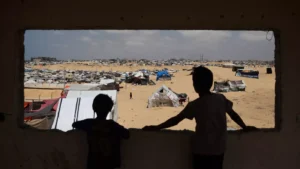The closure of the gateway to Egypt since May has prevented Palestinians from reuniting with loved ones who fled Gaza

Palestinian children stand in a camp for displaced people in Rafah, southern Gaza, near the Egyptian border
Ahmed Alsammak reports in Middle East Eye 15 September 2024
When Anoud was diagnosed with stomach cancer in July 2023, she never imagined her path to recovery would unfold amid a brutal war that would tear her from her husband and two young daughters.
That summer, when presented with a treatment plan, doctors informed Anoud that she would need to travel frequently to the occupied West Bank for chemotherapy sessions, as they were unavailable in the besieged Gaza Strip.
A few months later, war erupted in Gaza and the Israeli military tightened its siege on the enclave, blocking essential supplies such as water, electricity, fuel, food and vital medications. This left countless Palestinians without access to the necessary treatments or the possibility of seeking them elsewhere.
“She was supposed to travel to take her doses, but she couldn’t due to the war. Unfortunately, that led to the spread of cancer in her body. Her condition has deteriorated to the point where she has lost the ability to move,” her husband, Ibrahim Rayyan, told Middle East Eye.
After numerous appeals, the Palestinian health ministry in the West Bank facilitated Anoud’s travel to Egypt.
On 17 April, Anoud set out for the Rafah Crossing with Ibrahim and their daughters, aged six and three. However, Egyptian authorities informed them that her husband and children were not registered in the travel records, preventing them from accompanying her.
With no other choice, Anoud continued her journey to Egypt with her mother-in-law and then travelled to Doha for further treatment.
To reunite the family, Ibrahim launched a crowdfunding campaign to cover the $10,000 required for their travel permits, which had to be paid to an Egyptian intelligence-affiliated travel agency called Hala Consulting and Tourism Services.
Middle East Eye reported in May that Hala was earning $2m daily from Palestinians fleeing the war in Gaza, where the poverty rate reached 64 percent in 2023, according to the World Bank.
The family’s travel appointment was scheduled for 21 May, just days after the Israeli army occupied the Rafah crossing, halting all travel in and out of Gaza.
“Why did they prevent us from travelling with mum? I miss her so much. I desperately need her. The war is so scary without her. I need mum,” Anoud’s six-year-old daughter, Watin, tearfully told Middle East Eye.
Rayyan said his daughters are in anguish, constantly asking about their mother and wondering when Israel will reopen the crossing so they can be reunited.
“They are just children and need to be with their mum. Whenever they hear bombings, they run to me, saying: ‘Please take us to mum. There’s no bombing there.’ It’s too much for me to be both a father and a mother, especially during a war,” Rayyan said.
“Anoud always tells me she regrets leaving and wishes she had stayed in Gaza, even if it meant dying with her daughters from lack of treatment. I am doing my best to support her. Thankfully, she is getting better now.”
As Israel continues to occupy strategic areas in Gaza, including the Netzarim Corridor, which cuts through central Gaza, and the Philadelphi Corridor, connecting the strip to Egypt, Hamas said there would be no ceasefire deal without the Israeli army’s withdrawal.
More …

